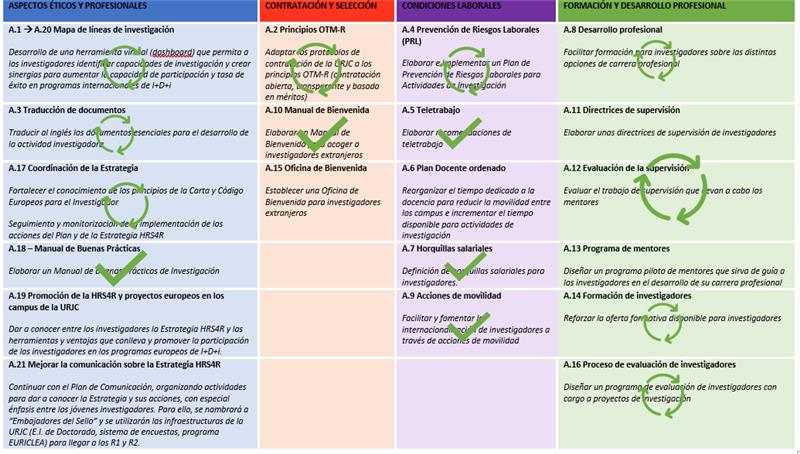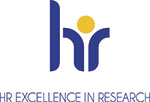HRS4R STRATEGY
HRS4R Strategy
La Human Resources Strategy for Research (HRS4R) is a tool launched by the European Commission to support institutions and organizations that finance research in the application of the European Charter for Researchers and the Code of Conduct for the hiring of researchers, to those who the URJC joined in September 2018.
El target of this Strategy is to attract and maintain scientific talent in Europe, promote the mobility of researchers, ensure a good work environment and promote the development of their professional careers. In addition, it also promotes employment and economic growth through the establishment of a competitive, transparent and open scientific labor market.
The URJC thus undertakes, in accordance with its internal policies, to develop its human resources strategy, adhering to the recommendations and principles set forth in the Charter and the Code, and to guarantee transparency, accessibility, equity and the search for of excellence in the recruitment of researchers.
European Charter for Researchers
En December 2023 was adopted EU Council Recommendation on a European framework to attract and retain research, innovation and entrepreneurial talent in Europe which approves the European Charter for Researchers replacing the European Charter and Code of Researchers 2005. These documents are recommendations from the Commission to the Member States, so they are voluntary for the Member States to adopt and comply with.
The 2023 Code consolidates the 2005 instruments, merging into a single text the general principles and requirements established in the Paper, which define the responsibilities and rights of researchers and institutions that finance and manage research projects, and the Code, which sunderlines the importance of recruitment procedures being open, transparent and merit-based.
In this way, the European Charter for Researchers 2023 It encompasses the rights and responsibilities of researchers, employers, funders and policy makers. It consists of 20 principles key classified in the four pillars following:
- Ethics, Integrity, Gender and Open Science;
- Evaluation, recruitment and progression of researchers;
- Working conditions and practices;
- Research and talent development careers.
The Researchers' Charter is addressed to all researchers, the sectors that carry out research and the respective coordinating organizations (stakeholders).
Human Resources Strategy for Researchers (HRS4R)
Source: ESHorizonte2020 - Spanish Portal of the Framework Program for Research and Innovation of the European Union
HRS4R Seal
In July 2020, after the approval of the Action Plan that ensures compliance with the principles of the European Charter and Code of Researchers, the University obtained from the European Commission the HRS4R Seal. This emblem identifies the institutions that generate and support the existence of a stimulating and favorable environment for the researcher's work.
So far, 725 organizations, 166 of them Spanish, have received the Seal.
Who is the HRS4R Strategy aimed at?
The HRS4R Seal Strategy is for all researchers of the URJC, both Spanish and foreign, regardless of their contractual figure and the moment in which their professional career is. According to the European Commission, there are four states through which the research career passes. For each of them, the Commission has established a profile with a competence framework. These profiles are described below.
R1-NOVEL RESEARCHERS
New researchers are those who are at the beginning of their research careers before they have obtained their doctorate degree (or equivalent qualification). These are those who carry out research activities under supervision. Its competencies are:
- The development of research activities under supervision.
- The ambition to develop their knowledge in research methodologies and disciplines.
- Demonstrated ability to have a well-grounded understanding of a specific area of knowledge.
- Demonstrated ability to produce scientific data under supervision.
- The ability to perform critical analysis, evaluation and synthesis of new and complex ideas.
- The ability to explain scientific results and their value to peers.
- Ideally, the development of language and communication skills appropriate to their environment, especially in international contexts.
R2-RECOGNIZED RESEARCHERS
Recognized researchers are those who have already obtained their doctorate or who have an equivalent level of experience and skills. In addition to the qualities recognized for novice researchers (R1), recognized researchers (R2) are required to:
- Have demonstrated a systematic understanding of a specific area of knowledge and mastery of research in that area.
- Have demonstrated the ability to develop, design, implement and fully adapt a research program with scientific relevance.
- They have contributed, through their activity, to research in their area of knowledge, opening new horizons of research through their innovative work or the development of a specific application. Said activity may consist of national or international publications or patents that have been the subject of scientific reference in the area of knowledge.
- Have the ability to explain scientific results and their value to the scientific community.
- Take charge and manage your research career development, setting realistic and achievable goals, and identify and develop ways to increase your employability.
- Be co-authors of scientific articles that are presented at congresses and conferences.
In addition, ideally, R2 investigators should have the following competencies:
- Understand industrial policy and other sectors of the labor market.
- Understand the value of your research work taking into account the context of existing products and services in the industry and in other sectors of the labor market and the economy.
- Communication of their knowledge and scientific results to an extensive research community and to society in general.
- Mentoring of new researchers (R1), helping them to be more effective and successful in their R&D&i trajectory.
R3-CONSOLIDATED INVESTIGATORS
Established researchers are those who have already obtained their doctorate, or an equivalent level, and who can carry out their research with a considerable degree of independence. In addition to the competencies of R1 and R2 researchers, consolidated researchers (R3) must present the following competency framework:
- They have a consolidated reputation based on excellence in their area of knowledge.
- They proactively and positively contribute to the development of knowledge, research and innovation through collaborations with other researchers and/or research communities.
- They identify the challenges and opportunities in their research area.
- They identify appropriate research methodologies and approaches.
- They carry out their research activity independently, contributing to the improvement and progress of research policies.
- They can take the lead in executing research projects in collaboration with other colleagues and project partners.
- They publish scientific articles as main authors and organize sessions at conferences, workshops and congresses.
As additional competencies that could be sought in R3 researchers, the following can be identified:
- The establishment of collaborative relationships with research or development groups of recognized prestige in the area of knowledge.
- Adopting an innovative approach to its research activity.
- The formation of consortiums to guarantee financing and budgetary allocation and resources by research centers or the industrial sector.
- The commitment to professionally develop their career and serve as mentors for other researchers.
R4-LEAD INVESTIGATORS
Lead researchers are those who have a leadership role in their area of knowledge. Normally they are team leaders or laboratory heads, although in some disciplines they are researchers without an attached work team.
The leading investigators (R4), at the end of the investigative trajectory, must meet the skills of the investigators of the other states (R1, R2 and R3) and also:
- Hold an international reputation based on excellence in their area of knowledge.
- Demonstrate critical judgment in the identification and execution of research projects and activities.
- Contribute in a significant and disruptive way to the area of knowledge or even with applications in other areas.
- Develop a strategic vision to achieve future progress in your area of knowledge.
- Recognize the implications and applications of their research activity beyond those strictly corresponding to their research and area of knowledge.
- Publish and make contributions in books and scientific journals of recognized prestige.
- Participate in the organization committees of workshops, conferences and congresses and carry out the tasks in these events in which they are invited to participate.
Likewise, it would be recommended that R4 researchers:
- Be experts in the management and leadership of research projects.
- Have skills in the management and development of the professional career of other researchers.
- Have a recognized reputation when it comes to guaranteeing financing and budget allocation and the necessary resources to develop research projects.
- Beyond collaborating with other colleagues and setting up work teams, they are capable of establishing, developing and achieving long-term goals in team planning (for example, guaranteeing the stability of the members of the research team and ensuring the financial resources of the team).
- Be expert communicators and in the creation of contact networks (networking) inside and outside the research community.
- Be able to promote and generate an innovative and creative environment for research activities.
- Be exemplary models of professional development for other researchers.
HRS4R STRATEGY AT THE URJC
Revised plan after the Mid-Term Evaluation
En julio de 2022, the URJC presented to the European Commission the mid-term evaluation report analyzing the progress and achievements achieved in the 18 actions launched under the initial Action Plan (2020-2022). After analyzing the URJC report, in November of 2022 The European Commission issued their conclusions indicating that the URJC had correctly and fully implemented the Human Resources Strategy for Researchers (HRS4R). With the recommendations of the Commission, the URJC has launched its Revised Plan (2023-2025), focusing on strengthening communication actions to increase awareness among the research community about the tools that the HRS4R Strategy makes available to them.
En November of 2025 The URJC will issue its final evaluation report and the European Commission will visit the institution in order to renew the HRS4R Seal.
The Table shows the actions of the initial Action Plan that are still underway and the new actions (19, 20, 21) that have been launched for the 2025 evaluation:



